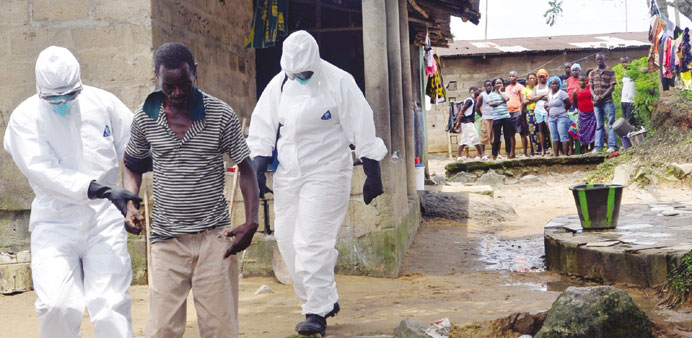A picture taken on Monday shows health workers in protective suits escorting a man infected with the Ebola virus to hospital in Monrovia.
The high proportion of health workers infected with the Ebola virus in West Africa is “unprecedented” and is hampering efforts to curb the epidemic, the World Health Organisation (WHO) said yesterday.
More than 240 healthcare workers have developed the disease in Guinea, Liberia, Nigeria and Sierra Leone while treating patients, and more than 120 have died, the UN agency said.
The causes of the high infection rate among medical personnel include a lack of protective equipment – even gloves and face masks – and its improper use, it said.
Other problems are a severe lack of medical staff and healthcare professionals who work in isolation wards for more hours than are considered safe, the WHO said.
Staff who are exhausted are more prone to make mistakes.
The high death toll of health workers was hindering efforts to bring the outbreak under control, the WHO warned.
Even before the outbreak, the number of physicians was low in the region, which has 1.5 doctors to every 100,000 patients, and doctors are concentrated in urban areas.
Since the outbreak began, some hospitals and clinics have had to close because of a lack of staff.
The African Union (AU) launched an urgent initiative yesterday to recruit additional healthcare workers from its member states.
In Liberia, one of the countries hardest hit by the epidemic, President Ellen Johnson Sirleaf is set to fire government officials refusing to return to Liberia to help fight the Ebola outbreak.
Government officials need to return to Liberia within a week, Johnson Sirleaf stipulated in a directive, the local newspaper Front Page Africa reported.
Officials currently in Liberia are banned from leaving the country.
“The Liberian leader has directed that all officials ... who violate the orders are hereby relieved of their positions,” the statement said.
A few exceptions have been granted to politicians who need urgent, specialised medical treatment outside Liberia or to those on “critical assignments”, the government said.
Rwanda and Uganda, meanwhile, became the latest African countries yesterday to restrict travel as a result of the Ebola outbreak.
Rwanda is banning travellers from Guinea, Liberia and Sierra Leone – the three nations hardest hit by the outbreak – as well as any traveller with a body temperature above 37.5 degrees Celsius, its health ministry said.
Uganda set up screening facilities at its six main border posts with the Democratic Republic of the Congo after Congo reported that 13 people had died there from Ebola.
Numerous African countries have restricted air, land and water travel in the region, causing a significant impact on the economy and on food security, the World Food Programme (WFP) said.
Also yesterday, the British Department of Health said it requested the experimental drug ZMapp from the WHO to treat a 29-year-old British health worker who was infected with Ebola in Sierra Leone and was evacuated to London.
Because ZMapp is not an approved drug, its supply is extremely limited.
“A few doses could be made available to us,” a department spokesman said.
The WHO said on Friday that the death toll across West Africa had risen to 1,427 with a total of 2,615 suspected or confirmed cases in the region.
Ebola causes massive haemorrhaging and has a fatality rate of up to 90%.
The disease is transmitted through contact with blood and other bodily fluids.
It has been particularly difficult to fight in some West African countries where hospital and diagnostic capacities have been overwhelmed and whole countries lack medical personnel, supplies and equipment, the WHO said.
Villages and cities in the affected countries were being ruled by “intense fear” because of the outbreak, the agency said.

